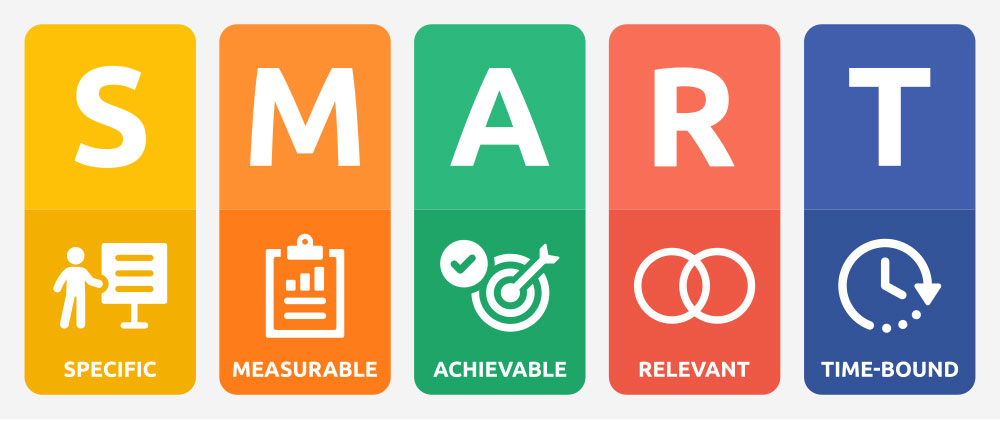
Do you feel like you’re working hard but getting nowhere? It might be because your objectives are too vague. To avoid this, you need SMART goals.
SMART stands for Specific, Measurable, Achievable, Relevant and Time-bound. This framework helps you set clear goals you can realistically reach.
In this blog, we explain how to create SMART goals step by step.
Key Takeaways
- SMART goals are specific, measurable, achievable, relevant and time-bound.
- Specific goals are easy to understand and pinpoint what you want to achieve.
- Measurable goals let you track progress and know when you succeed.
- Achievable goals are realistic and match your skills and resources.
- Relevant goals align with your bigger life or work plans.
- Time-bound goals set clear deadlines to keep you focused and moving forward.
What Are SMART Goals?
SMART goals are designed to give you clear direction. Each letter in SMART stands for a key part of a well-designed goal:
- Specific: The goal is clear and easy to understand.
- Measurable: You can track progress and know when you’re finished.
- Achievable: The goal is realistic, not impossible.
- Relevant: It fits your bigger plans and needs.
- Time-bound: You set a clear deadline.

How to Create SMART Goals
Everyone has at least one thing they want to achieve or get better at. Most of us have more than one.
But how many of these ambitions have you achieved?
Too often, these goals are abstract. You see yourself skipping straight to an ill-defined endpoint where things are just better, without any consideration of how you got there or what’s really changed. And when you come back to reality, your target actually feels further away than ever.
The SMART method solves this problem. It gives you a clear framework for defining goals and, more importantly, planning how you’ll actually make progress towards them.
Here’s how you can create goals using the SMART method.
S: Specific
Vague goals are useless. Your goals should be specific.
They must answer questions like:
- What exactly do you want to achieve?
- Why is this goal important?
- Who is involved?
- Where will it happen?
- What resources or limits are involved?
A vague goal like “I want to get better at sales” isn’t motivating, because it’s too broad. Be specific. Say, “I want to increase my monthly sales by finding 10 new clients through cold calling.”
Specific goals make steps clearer, which makes it easier to start and progress.
M: Measurable
Measurable goals let you track your progress.
These goals answer questions like:
- How much?
- How many?
- How will I know it is done?
A goal like “I want to be more productive” is unmeasurable. A measurable goal would be: “I want to finish three key tasks before lunch every day.”
You’re more likely to focus and keep working towards a goal with a defined endpoint.
A: Achievable
Your goals should be realistic. Avoid setting goals that are too easy or too hard.
These goals answer questions like:
- Can I do this with the skills and resources I have?
- Is this goal possible in the time I have?
An example of an unrealistic goal would be: “I want to double my sales in a week.” A more achievable goal would be: “I want to increase my sales by 10% over three months.”
Push yourself, but stay practical.
R: Relevant
Goals must link to your bigger plans. Otherwise, they waste your time.
To make your goals relevant, answer the following questions:
- Does this goal match my wider work or life plans?
- Will achieving this help me move forward?
If you aim to grow your career as a sales representative, learning how to play a guitar would be an irrelevant goal. A relevant goal would be: “I want to complete an advanced sales training course.”
Stay focused on goals that move you closer to where you want to be.
T: Time-Bound
Your goals must have a deadline. A time limit pushes you to take action and stay motivated.
To set time-bound goals, you must answer the following questions:
- When will you start?
- When must you finish?
- Are there checkpoints along the way?
Instead of saying, “I want to complete the client project,” set a goal like:
“I will complete the client project plan by Friday, review it with the team on Monday and deliver the final version to the client by the end of next week.”
Deadlines create urgency. They keep tasks moving and make sure work gets done on time.
Health and Safety Courses
Our health and safety courses support legal compliance and effective risk management. They raise awareness of common workplace hazards and teach the fundamentals of safe working.
Common Mistakes to Avoid
To give yourself a better chance at success, avoid these common mistakes:
- Being vague. Goals like “I want to do better at work” mean nothing without proper details.
- Setting unrealistic goals. Aiming too high, too fast leads to frustration and quitting.
- Setting irrelevant goals. Working on goals that don’t fit your bigger plans wastes time.
- Failing to plan your steps. Goals need clear action steps, not just a final result.
- Ignoring deadlines. Goals without time limits might seem more achievable, but they tend to drag on.
How to Track Your Goals
Tracking is as important as setting the goal. Without tracking, you risk losing focus. Whenever you’re working on a SMART goal, follow this process:
- Break the goal into steps. List small tasks you can finish each week.
- Use a checklist or journal. Tick off completed tasks to stay motivated.
- Set milestones. Create points where you review progress, like halfway marks.
- Schedule regular reviews. Set aside time every week to check your progress.
- Use simple tools like a notebook, calendar or phone app to record your progress.
Why SMART Goals Work
These goals work because they give you a clear plan. You know what you want, how to measure it and when to finish it.
This clarity saves time and helps keep you focused. You avoid chasing goals you can’t reach and make steady progress instead.
How Training Can Help
Setting SMART goals is a skill you can build with training. It helps you create clear goals, avoid mistakes and take the right steps to succeed.
We offer a SMART Objective Setting Training course that teaches you how to set goals that yield real results in both your personal and work life. It explains what SMART goals are, steps to build them, common errors to avoid and how to use them to improve performance. Enrol today and learn how to set goals that drive real success.





















